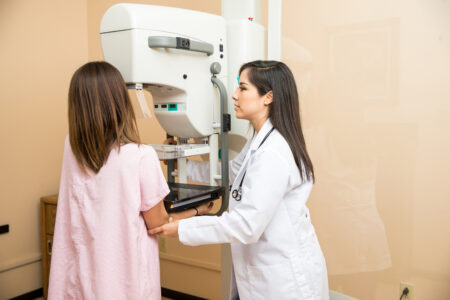
Share On Social!
Cancer continues to be tied with heart disease as the top cause of death for all people, including Latinos.
People of different backgrounds suffer higher rates of certain cancer types, are diagnosed at later stages, and are more likely to die from the disease. This is often due to issue with non-medical drivers of health in communities.
That’s why researchers choose to keep studying the intersection between background and health issues so that science and medicine can improve cancer outcomes for these individuals and everyone.
Here are three cancer studies that focus on cancer and background.
1. Trends in Incidence of Testicular Cancer
Testicular cancer remains the second –most common cancer in men aged 15-39 worldwide, according to a study published in the National Library of Medicine.
This is especially true for white men, who have statistically higher rates of testicular cancer.
With this in mind, researchers led by the Uniformed Services University of the Health Sciences sought to look at the incidence of testicular cancer across all groups to see how they compare and increase understanding to the benefit of all people.
Based on the study data, researchers discovered that Latino men had experienced some of the highest increases of testicular cancer in recent years. Researchers concluded that the incidence in Latino men had more than doubled from 1992 to 2021.
There may be several reasons for the increase.
But some of the risk factors associated with this type of testicular cancer include a condition where the testes fail to descend into the scrotum, inguinal hernia, genetics, and environmental factors among other things, according to the research.
2. Lung Cancer Treatment Issues
Another study explored lung cancer issues among patients of different backgrounds in Tennessee.
Specifically, researchers from several universities and health agencies investigated the early initiation of treatment for lung cancer.

Like most types of cancer, lung cancer is dependent on the early diagnosis and treatment of the disease to ensure better outcomes.
When examining the data, researchers found that Black patients were at a higher risk for delayed treatment.
“Cancer care resources are needed in [these] communities to ensure timely treatment of invasive lung cancer, reduce [issues], and promote [quality] care for all cancer patients,” according to the study.
In addition, patients with private insurance had a higher risk of late treatment over 2.7 weeks compared to self-pay or uninsured patients.
Furthermore, those who were diagnosed with localized or regional lung cancer stages had a decreased delay in treatment compared to those with more distant stage cancer type.
The reach of lung cancer also extends to other population groups.
While smoking is one of the biggest risk factors for lung cancer, Latinos are still at higher risk for delayed treatment due to non-medical drivers of health, such as access to care, transportation, income, insurance, and more.
However, a proposed rule by the U.S. Food and Drug Administration (FDA) is looking to reduce the nicotine levels in cigarettes in hopes of decreasing the health impacts of smoking on the body.
You can submit a model comment by Sept. 15, 2025, created by Salud America! urging the FDA to make cigarettes and other tobacco products less addictive today.
3. ‘Forever Chemicals’ Found in Drinking Water Linked to Cancer
A new study out of the Keck School of Medicine of USC has found a link between PFAS or “forever chemicals” in drinking water and certain types of cancer, according to a recent news release.
Sometimes found in non-stick coating, cleaning agents, packaging, and other manufactured goods, PFAS or “forever chemicals” are hazardous to health and safety and are hard to break down over time, causing damage to the environment.
While there have been efforts by many agencies that use these products to cut down on their use or safely dispose of their waste, “forever chemicals” continue to pollute the air and drinking water, putting people’s health at risk.
The study published by the Journal of Exposure Science & Enviornmental Epidemiology found that PFAS in drinking water can cause a 33% higher incidence of certain cancers.
This is particularly alarming considering PFAS has been found in 45% of drinking water supplies across the country, according to a journal article on PFAS and water.
Research on the topic has concluded that PFAS is linked to a wide array of health problems, including kidney, breast, and testicular cancers.
However, this particular study has found new evidence to support the link between PFAS and rare cancers such as digestive, endocrine, respiratory, and mouth and throat cancers, according to the accompanying news release.
Need for More Participation in Cancer Studies
Cancer and Alzheimer’s hurt many of our abuelos, moms, dads, and others we love.
Clinical trials help us fight for our familia.
Clinical trials are studies that help researchers learn more to help slow, manage, and treat Alzheimer’s and cancer for current and future family members. But without volunteers for clinical trials, the benefits may miss this group.
Visit our clinical trials page to find a clinical trial, read about hero volunteers, and more!
“Volunteers in clinical trials are not only helping themselves, but they’re also building a future with better treatments that can help their families in the future,” said Dr. Amelie Ramirez, director of Salud America! and the Institute for Health Promotion Research at UT Health San Antonio.
Those looking for opportunities based in San Antonio can search the Mays Cancer Center at UT Health San Antonio’s Find a Clinical Trial database to learn more about available clinical trials and eligibility requirements.
On a national level, visit clinicaltrials.gov to find a clinical trial near you.
Explore More:
CancerBy The Numbers
142
Percent
Expected rise in Latino cancer cases in coming years



